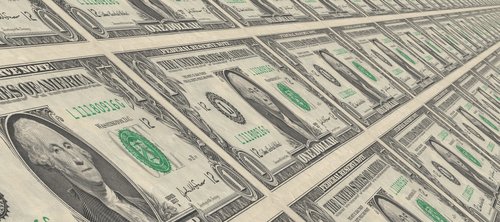I Do Not Always Know How To Define Bad Economics, 'But I Know It When I See It' In Regards To China Over The Last Few Years.
Thursday, 21 February 2019By Rob Julian

With our capitalist free market economies in Europe, the U.S. and elsewhere, we thought we had settled upon what was clearly the best set of rules and frameworks for running economies. And then China came along and ripped up our rulebook, ignored our example, and is widely thought to be on track to be the biggest economy in the world. But after reading Dinny McMahon's new book,'China's Great Wall of Debt; Shadow Banks, Ghost Cities, Massive Loans and the End of the Chinese Miracle', I do not think China will get to that position for quite some time.
Just as the respected US Justice of the Supreme court, Potter Stewart famously said in relation to the difficulties of categorizing pornography; “But I know it when I see it,” likewise anyone versed in economic history will be instinctively alarmed at China's recent reckless economic patterns. Furthermore, I believe our sensible old blueprint for how to do economies will, in the next few years, come to be revived, re-lauded and re-appreciated for the hundreds of years of robustness, wisdom, and experience contained within its norms.
For a start, we call ourselves 'capitalists', reflecting the central place allocating capital, and private capitalists receiving the rights to the residual profits from their capital has in our economic framework. In the last few years, China has allocated its capital very very badly. If you do not realise exactly how extremely badly, then please read this book. When the returns on the loans made for the ghost cities, empty business parks, underused airports; and the overcapacity in many state-owned businesses, finally catch-up with China's distorted financial system, we will all realize just how badly.
When the tide goes out and reveals just how bad things are in China, Britain's inability to build itself enough houses or even a paltry third runway at its biggest hub airport, will look, still pathetic and quaint, but perhaps reassuringly cautious and measured against the sheer scale of the Chinese construction calamity.
The state directed assertive moves of China into becoming the manufacturer to the world worked well, mainly because the path was there to follow. But the post-2008 construction frenzy in China has taken on an economically dangerous life of its own. This addiction to debt-fuelled construction is being driven largely by local government officials and city mayors, who have become addicted to a land re-zoning and a construction gravy train. Forcing a construction boom in their locality increases their local growth, tax take, and in some instances opportunity for self-enrichment.

At the same time, many of China's state-owned businesses are only being kept afloat by huge amounts of debt from state-owned banks, and investment that is often unproductive. The priority is growth and preventing social unrest. The one thing they do not focus on is the boring consideration of the (much maligned by the political far left) western accountant or securities analyst; I.E. whether the investments actually are worthwhile in that they make a return suitably commensurate with the risk and capital invested.
Here are some worrying statistics reported in Mr McMahon's book:
- Just between 2011 and 2013, China used more cement than the US did during the whole of the twentieth century p84
- China's banking system has quadrupled in size over the last nine years pxiv-xiii
- The current volume of empty properties, plus those in the pipeline and planned for, would be sufficient to house more than China's total population all over again p59
- The whole property and construction sector has grown to become 20% of the economy, which is equivalent to the building booms in Ireland and Spain before 2008, and triple the ratio of the US in the infamous sub-prime era. p88
- Studies have counted around 50 ghost cities across China. p67
- Land sales now account for roughly a third of all revenue for local governments. P78-9
- The amount of funds local government got from land sales was in 2014, 31 times the amount compared with 2001. p79
- The level of corporate debt has more than tripled since the eve of the 2008 crisis. p31
- Since 2014, China has produced more than half of all the steel in the world, but it is still only running at 70% of its capacity, and more than half of its steel firms are not making profits. p43
- China has between 2007 and 2015, been responsible for 63% of all new money created globally. p122
Some of those on the left frequently gripe about our society being run in the selfish interests of profit, business returns, and finance. “Why can't we live in a kinder society where everything is not all about money,” they cry? Wait a year or so … and see what happens when a Chinese alternative to this complex and evolved framework for organising economies, breaks down under the weight of its own inefficiency and bad debts.
Yes, our western model of capitalism runs largely on the motive of greed, and one of its strengths is that it assumes, and more importantly can withstand, each actor who has climbed up the ranks of the business world being selfish. China is demonstrating what happens when the greed often in human nature especially of those who seek advantage, combines with a system where there are few checks and balances. In China, having the ability and connections to be high up in local government, or a state-owned company or bank, (or, revealingly, connections to all of the above at the same time) gives you the scope to abuse your power which an unscrupulous capitalist western businessman or women could only dream of.
In his book Law, Legislation and Liberty, Fredrick Hayek wrote:
“Capitalism … suggests a system which mainly benefits the capitalists, while in fact, it is a system which imposes upon enterprise a discipline under which the managers chafe and which each endeavors to escape.” p59.
Later in the book he also wrote:
“Rules are a device for coping with our constitutional ignorance. There would be no need for rules among omniscient people who were in agreement on the relative importance of all the different ends.”p176.
Reflecting on this way of thinking, it is as if the Chinese system requires that their government officials be proactively 'omniscient' in how they manage their economy and what economic ends they pursue. They have none of Hayek's implicit rules of capitalism to guide the system. To be fair the Chinese government have had a pretty good stab at omnisciently transforming China into a world-beating manufacturer, but after 2008 many local government officials have proven to be all too human in falling for the construction boom rouse.
2008, of course, showed that our free market economies can fall into hubris and can be driven by fear and greed, but the issues were confined to the finance and housing sectors. China's crisis might likewise highlight hubris, greed, and fear, but across a wider proportion of their economic machine.
After 2008, the controversial bailouts of large banks in some western countries was a clear single example where the general public could observe funds crossing over from our taxpayer pockets to private capitalist bank coffers, and some were very annoyed. That was one clearly defined cross payment which stuck out in the usually quite clearly delineated framework of our economies, where government and private commerce is usually quite separate. The starting point in China has no such defined separation between banks, state-owned businesses, and local government. The equivalent of our taxpayer bailouts to large companies are happening every day, and wait until a crisis happens when the muddy water of China's incestuous financial infrastructure will really be highlighted.

The economists and political theorists who had thought that the western model we learned at school, of democratic accountability and separation of powers within government, might yet be vindicated. The inherent value of having accurate statistics, accurate company accounts, prices based on supply and demand, free competitive markets, fewer government subsidies, and intervention; all might in a few years be re-evaluated.
….....but, being the devil's advocate, would China ever have gotten this far if it had always followed the western free market blueprint? I don't think so. And is it not an impossible task to expect a country to start out running extremely fast in one direction, then transform into another, on the move, without dropping a beat? As far as its economics goes perhaps the old Chinese curse applies. “China, over the next decade, you are going to be living in interesting times in terms of economic and political theory.” Good luck for your sakes and ours.
